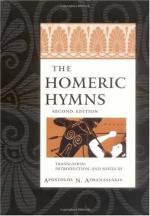Therewith he drave on together the sturdy heads of cattle. And over many a shadowy hill, and through echoing corries and flowering plains drave renowned Hermes. Then stayed for the more part his darkling ally, the sacred Night, and swiftly came morning when men can work, and sacred Selene, daughter of Pallas, mighty prince, clomb to a new place of outlook, and then the strong son of Zeus drave the broad-browed kine of Phoebus Apollo to the river Alpheius. Unwearied they came to the high-roofed stall and the watering-places in front of the fair meadow. There, when he had foddered the deep-voiced kine, he herded them huddled together into the byre, munching lotus and dewy marsh marigold; next brought he much wood, and set himself to the craft of fire-kindling. Taking a goodly shoot of the daphne, he peeled it with the knife, fitting it to his hand, {140} and the hot vapour of smoke arose. [Lo, it was Hermes first who gave fire, and the fire-sticks.] Then took he many dry faggots, great plenty, and piled them in the trench, and flame began to break, sending far the breath of burning fire. And when the force of renowned Hephaestus kept the fire aflame, then downward dragged he, so mighty his strength, two bellowing kine of twisted horn: close up to the fire he dragged them, and cast them both panting upon their backs to the ground. [Then bending over them he turned them upwards and cut their throats] . . . task upon task, and sliced off the fat meat, pierced it with spits of wood, and broiled it,—flesh, and chine, the joint of honour, and blood in the bowels, all together;—then laid all there in its place. The hides he stretched out on a broken rock, as even now they are used, such as are to be enduring: long, and long after that ancient day. {141a} Anon glad Hermes dragged the fat portions on to a smooth ledge, and cut twelve messes sorted out by lot, to each its due meed he gave. Then a longing for the rite of the sacrifice of flesh came on renowned Hermes: for the sweet savour irked him, immortal as he was, but not even so did his strong heart yield. {141b} . . . The fat and flesh he placed in the high-roofed stall, the rest he swiftly raised aloft, a trophy of his reiving, and, gathering dry faggots, he burned heads and feet entire with the vapour of flame. Anon when the God had duly finished all, he cast his sandals into the deep swirling pool of Alpheius, quenched the embers, and all night long spread smooth the black dust: Selene lighting him with her lovely light. Back to the crests of Cyllene came the God at dawn, nor blessed God, on that long way, nor mortal man encountered him; nay, and no dog barked. Then Hermes, son of Zeus, bearer of boon, bowed his head, and entered the hall through the hole of the bolt, like mist on the breath of autumn. Then, standing erect, he sped to the rich inmost chamber of the cave, lightly treading noiseless on the floor. Quickly to his cradle came glorious Hermes and wrapped the swaddling bands about his shoulders, like a witless babe, playing with the wrapper about his knees. So lay he, guarding his dear lyre at his left hand. But his Goddess mother the God did not deceive; she spake, saying:




